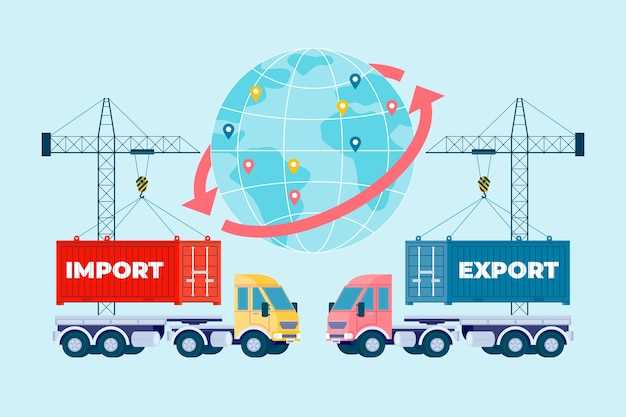
As businesses continue to expand their operations on a global scale, the need for efficient and interconnected supply chains becomes increasingly crucial. In order to facilitate seamless international trade, it is essential to have standardized systems in place that ensure the smooth flow of goods and services across borders. One such system that plays a vital role in enhancing global supply chains is the utilization of unique identification codes.
These identification codes, similar to those of a CAGE code, are assigned to businesses and organizations involved in international trade. By implementing these codes, businesses can effectively streamline their supply chain operations, ensuring maximum efficiency and productivity. These codes serve as an essential tool for connecting suppliers, manufacturers, and customers across various geographies, enabling seamless communication and collaboration.
Moreover, the use of identification codes enhances transparency in international trade by providing clear and concise information about the origin and attributes of products. They enable businesses to track and trace products throughout the entire supply chain, from raw materials to finished goods, ensuring compliance with regulatory standards and minimizing the risk of counterfeit or substandard products entering the market.
Furthermore, the utilization of identification codes fosters trust and confidence among businesses and consumers alike. By providing a standardized framework for identifying and verifying suppliers, these codes help mitigate the risks associated with engaging in global trade, such as fraud and non-compliance. They also allow businesses to establish strong relationships with trusted partners, leading to enhanced collaboration and innovation within the industry.
In conclusion, the implementation of unique identification codes, such as CAGE codes, plays a pivotal role in enhancing the efficiency and connectivity of global supply chains. By streamlining operations, improving transparency, and fostering trust, these codes enable businesses to capitalize on the opportunities offered by international trade while minimizing the associated risks. In an increasingly interconnected world, the adoption of standardized systems becomes a fundamental necessity for businesses seeking to thrive in the global marketplace.
Understanding CAGE Codes and their Significance in International Trade
Exploring the essence of identification systems within the realm of global commerce provides an insightful perspective on the vital role played by CAGE Codes. These intelligent alphanumeric designations serve as fundamental elements in international trade facilitation, offering a comprehensive understanding of market dynamics and fostering seamless global interaction.
Streamlining Supplier Identification
One of the key benefits of CAGE Codes is their ability to streamline the identification process of suppliers in international trade. By assigning unique identifiers to entities involved in cross-border transactions, these codes simplify the discernment of reliable partners and contribute to more efficient supply chain management. Importers and exporters can readily identify their counterparts while ensuring compliance with regulatory frameworks and industry standards.
Enhancing Accountability and Transparency
CAGE Codes significantly enhance accountability and transparency in the international trade ecosystem. By systematically cataloging relevant information about entities engaged in global transactions, these codes promote a higher level of integrity and ethical conduct. Governments, regulatory bodies, and market participants can easily access essential data, ultimately fostering fair competition, preventing fraud, and mitigating risks within the global supply chain.
The Role of CAGE Codes in Streamlining Global Supply Chains
Efficient and seamless coordination of global supply chains is crucial for organizations engaged in international trade. In this regard, an essential component that contributes to the smooth operation of global supply chains is the utilization of CAGE codes.
These unique identifiers play a vital role in streamlining the overall process by providing organizations with a standardized method for tracking and identifying suppliers, manufacturers, and contractors involved in the production and distribution of goods and services across borders. CAGE codes, by eliminating the need for complicated and time-consuming communication exchanges, foster transparency and enhance collaboration while minimizing inefficiencies.
By establishing a universal language, CAGE codes enable businesses to quickly locate and engage with global partners, ensuring adequate supply chain management, and optimizing logistical operations. This standardized system of identification helps in accurately assessing the capabilities and qualifications of potential suppliers, allowing organizations to make informed decisions regarding sourcing and partnership opportunities.
Moreover, the implementation of CAGE codes significantly reduces the risk of engaging with unauthorized or unreliable entities, safeguarding organizations against potential fraud, counterfeiting, or non-compliance issues. It enables businesses to verify the legitimacy of suppliers and contractors, thus ensuring the integrity and reliability of the entire supply chain network.
In conclusion, the role of CAGE codes in streamlining global supply chains cannot be overstated. The implementation of these unique identifiers revolutionizes the way organizations communicate, collaborate, and conduct business across borders. By simplifying the process of identifying and verifying partners, CAGE codes enhance the efficiency, transparency, and security of global supply chains, contributing to the overall success of international trade.
Benefits and Challenges of Implementing CAGE Codes in International Trade
Exploring the advantages and obstacles associated with integrating CAGE Codes into the realm of global commerce offers valuable insights into enhancing supply chain efficiency and streamlining international trade processes. This section examines the potential benefits and unique challenges that arise when implementing CAGE Codes, enabling a better understanding of their impact on the interconnected network of global trade.
Embracing CAGE Codes in international trade opens up a plethora of benefits for businesses and governments alike. These alphanumeric identifiers provide a standardized method for identifying and tracking entities engaged in international transactions. By using CAGE Codes, organizations can improve their efficiency in procurement processes, simplify vendor management, and enhance supply chain visibility. This streamlined approach facilitates enhanced communication and collaboration among global partners, resulting in faster order processing, reduced errors, and increased overall operational effectiveness.
However, the implementation of CAGE Codes in international trade is not without its challenges. One key obstacle lies in the complexity of assigning and maintaining these codes across borders and different industries. Harmonizing CAGE Code systems and ensuring accurate data entry can become particularly demanding when dealing with diverse languages, legal frameworks, and technical standards. Additionally, the cost associated with integrating CAGE Code systems across various stakeholders and the need for robust training and support can present financial and logistical challenges for businesses.
Moreover, the adoption of CAGE Codes introduces potential privacy and security concerns. As global trade becomes increasingly digitized, the collection and sharing of sensitive data associated with CAGE Codes may open doors for unauthorized access or misuse. Safeguarding data integrity and ensuring secure information interchange are vital factors that demand constant vigilance and comprehensive cybersecurity measures.
In conclusion, the benefits of implementing CAGE Codes in international trade, such as improved supply chain efficiency and enhanced communication, are integral to the advancement of global commerce. However, businesses and governments must actively navigate challenges, including system harmonization, cost considerations, and data security, to fully capitalize on the advantages that CAGE Codes offer in today’s interconnected global marketplace.
How CAGE Codes Facilitate Efficient Communication and Collaboration in Global Supply Chains
In today’s interconnected world, effective communication and collaboration are vital for the smooth operation of global supply chains. Utilizing a standardized identification system such as CAGE Codes helps streamline the process and enhances efficiency in these complex networks.
Streamlining Communication
CAGE Codes provide a unique and standardized identification for entities involved in international trade. By using these codes, organizations can easily communicate and exchange information with their partners and stakeholders across the global supply chain. Rather than relying on lengthy and error-prone descriptions, CAGE Codes provide a concise and universally recognized method of identification.
Fostering Collaboration
Collaboration is crucial for successful supply chain management, and CAGE Codes play a significant role in fostering collaboration among the various entities involved. With a shared understanding and usage of these codes, organizations can quickly identify and locate specific partners, suppliers, or customers within the global network. This facilitates effective coordination, decision-making, and problem-solving, leading to improved efficiency and cost-effectiveness.
- Enhanced traceability: CAGE Codes enable the tracing of goods and services as they move through the different stages of the supply chain. This traceability ensures transparency and accountability, minimizing the risk of fraud and counterfeits.
- Efficient procurement processes: By using CAGE Codes, procurement teams can efficiently identify and evaluate potential suppliers based on their capabilities, qualifications, and past performance. This streamlined process saves time, reduces administrative burden, and helps organizations make informed sourcing decisions.
- Standardized documentation: CAGE Codes also facilitate the exchange of standardized documentation, such as contracts, invoices, and shipping details. This standardized approach simplifies administrative tasks and reduces potential misunderstandings or errors, resulting in smoother transactions.
- Improved risk mitigation: The use of CAGE Codes allows supply chain stakeholders to assess and mitigate risks effectively. They can easily identify the geographic locations of suppliers, analyze the potential impact of geopolitical factors, and develop contingency plans to ensure business continuity.
In conclusion, CAGE Codes play a crucial role in facilitating efficient communication and collaboration in global supply chains. By providing a standardized method of identification, these codes streamline communication, foster collaboration, enhance traceability, improve procurement processes, standardize documentation, and enable effective risk mitigation. Embracing CAGE Codes can contribute to the overall success and resilience of international trade and supply chain operations.
The Importance of CAGE Codes in Ensuring Compliance and Security in International Trade
Ensuring compliance and security in international trade is of utmost importance for maintaining the integrity and efficiency of global supply chains. A key factor in achieving this is the utilization of CAGE codes, which play a vital role in promoting transparency, accountability, and trust between international trading partners.
By using CAGE codes, businesses are able to establish a standardized and reliable system for identifying and tracking various entities involved in international trade. These codes provide a unique identifier for each entity, allowing for seamless communication and verification of information across different countries and jurisdictions.
The significance of CAGE codes lies in their ability to facilitate compliance with regulations and requirements imposed by government authorities and international trade organizations. These codes help ensure that all involved parties adhere to relevant laws, regulations, and industry standards, minimizing the risk of non-compliance and the associated legal and financial consequences.
Additionally, CAGE codes contribute to enhancing security in international trade by enabling effective screening and risk assessment processes. With a standardized identification system in place, organizations can quickly and accurately assess the credibility and trustworthiness of potential trade partners, mitigating the potential risks associated with illegal activities, fraud, or security breaches.
In summary, CAGE codes serve as a crucial tool in maintaining compliance and security in international trade. Through their use, businesses can establish a transparent and accountable trading environment that fosters trust and confidence among trading partners. These codes not only facilitate compliance with regulations but also enhance security measures, ultimately contributing to the seamless functioning of global supply chains.
The Future of CAGE Codes in International Trade and Supply Chain Management
In this section, we will explore the evolving role and significance of unique identification systems in the context of international trade and supply chain management. Emphasizing the importance of standardized and efficient global supply chains, we will discuss how the utilization of innovative identification methods can enhance transparency, traceability and optimize the overall management of supply chains.
Streamlining Supply Chain Processes
One key aspect of future advancements in international trade and supply chain management lies in the streamlining of various processes. As companies strive to operate in a highly interconnected global market, the need for effective tracking and monitoring mechanisms becomes increasingly vital. By employing advanced identification systems, businesses can ensure better visibility and control over their supply chains, enabling a seamless flow of goods and services.
Building Trust and Mitigating Risks
With the ever-expanding global trade landscape, establishing trust and mitigating risks have become paramount for businesses involved in international transactions. Innovative identification systems play a vital role in enhancing trust among supply chain partners, as they enable accurate verification and authentication of various entities involved. By implementing reliable and secure identification methods, such as unique codes and digital certificates, organizations can significantly reduce the potential risks associated with counterfeit products, theft, or unauthorized access.
In conclusion, the future of international trade and supply chain management lies in the adoption and further development of advanced identification systems. The integration of innovative technologies and standardized identification methods will not only optimize supply chain processes but also foster trust, transparency, and efficiency in global trade operations.



